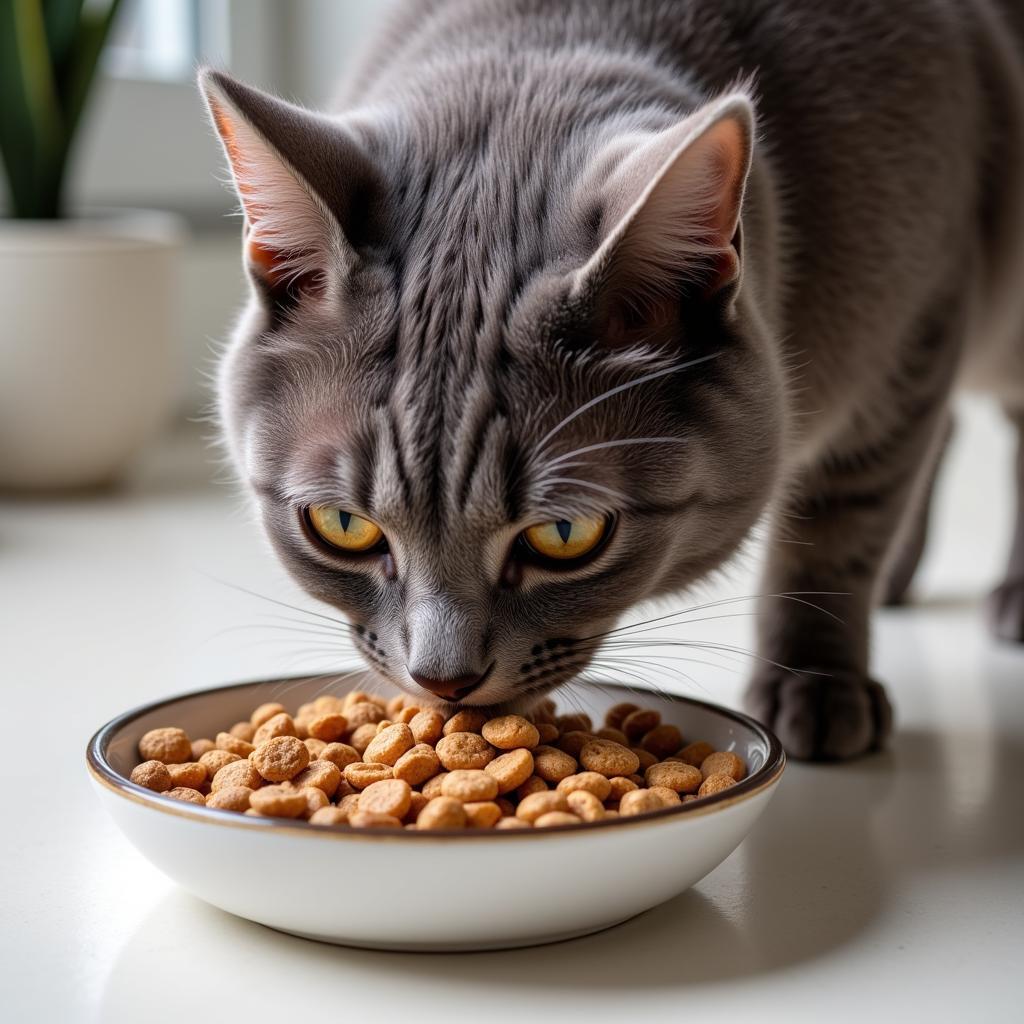Choosing the right British Shorthair Cat Food is crucial for their health and well-being. From kittenhood to their senior years, understanding their specific nutritional needs will help your furry friend live a long, happy, and healthy life.
Understanding the Nutritional Needs of a British Shorthair
British Shorthairs are known for their sturdy build and dense coat. This beautiful breed requires a balanced diet tailored to their unique characteristics. While they may look like they can handle anything, paying close attention to their food is essential to prevent obesity, a common issue in British Shorthairs. Their diet should be rich in high-quality protein for muscle maintenance, moderate in fat for energy, and contain essential vitamins and minerals for overall health.
 A British Shorthair cat enjoying a bowl of premium cat food
A British Shorthair cat enjoying a bowl of premium cat food
Choosing the Right British Shorthair Cat Food: Dry vs. Wet
Deciding between dry and wet food can be a dilemma. Both have their pros and cons. Dry food is convenient, cost-effective, and helps with dental health. Wet food, on the other hand, is higher in moisture content, which is beneficial for urinary tract health and can be more appealing to picky eaters. Ultimately, the best choice depends on your cat’s individual preferences and health needs. Consult your veterinarian for personalized advice.
Dry Food for British Shorthairs
Dry kibble offers a convenient and affordable option. Look for formulas specifically designed for British Shorthairs or those formulated for adult cats with moderate activity levels. Check the ingredient list for high-quality protein sources, like chicken or fish, and avoid fillers like corn and wheat.
Wet Food for British Shorthairs
Wet food provides essential hydration. Choose high-quality wet food options with a high meat content and limited additives. Look for formulas with added taurine, an essential amino acid for heart health. While wet food can be more expensive than dry food, the added moisture can be especially beneficial for British Shorthairs prone to urinary tract issues.
Addressing Common Health Concerns with Diet
British Shorthairs are generally a healthy breed, but they are predisposed to certain conditions like hypertrophic cardiomyopathy (HCM) and polycystic kidney disease (PKD). While diet alone cannot prevent these conditions, choosing the right food can support overall health and potentially mitigate some risks.
Food for a Healthy Heart
For British Shorthairs, maintaining a healthy weight is crucial for heart health. Choose a food that is not overly calorie-dense and encourages portion control. Taurine is an essential amino acid for heart function, so ensure your chosen food contains adequate amounts.
“A balanced diet is paramount for heart health in British Shorthairs. Avoid overfeeding and ensure they receive enough taurine,” says Dr. Emily Carter, DVM, a feline specialist with over 15 years of experience.
Supporting Kidney Health Through Diet
For kidney health, providing adequate hydration is key. Wet food can contribute significantly to your cat’s water intake. Additionally, choosing a food with controlled phosphorus levels may be beneficial for cats with or at risk of kidney disease.
“Hydration is crucial for kidney health, especially in breeds prone to kidney issues. Wet food can be a valuable tool in ensuring adequate water intake,” adds Dr. Carter.
Conclusion
Choosing the right British Shorthair cat food is a vital part of responsible pet ownership. By understanding their specific needs and choosing a high-quality, balanced diet, you can help your British Shorthair thrive. Remember to consult your veterinarian for personalized advice, especially if your cat has any underlying health conditions. With proper nutrition and care, your British Shorthair can enjoy a long, healthy, and purrfectly happy life.
FAQ
- What is the best type of food for a British Shorthair kitten? Kitten-specific formulas are crucial for their rapid growth and development.
- How much should I feed my British Shorthair? Follow the feeding guidelines on the food packaging and adjust based on your cat’s age, activity level, and weight.
- Can I give my British Shorthair treats? Treats are fine in moderation, but ensure they are healthy and don’t contribute to excessive calorie intake.
- What are the signs of food allergies in British Shorthairs? Skin irritation, vomiting, and diarrhea can be signs of food allergies. Consult your vet if you suspect an allergy.
- Should I switch my senior British Shorthair to senior food? Senior formulas are often easier to digest and address the specific needs of older cats.
Need support? Contact us at Phone Number: 02437655121, Email: [email protected] Or visit our address: 3PGH+8R9, ĐT70A, thôn Trung, Bắc Từ Liêm, Hà Nội, Việt Nam. We have a 24/7 customer service team.